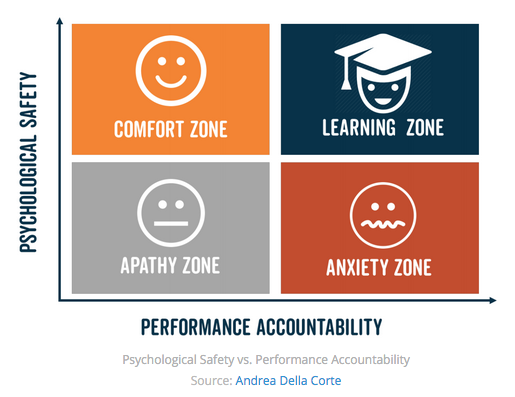The Key to Building Great Teams In The Workplace: Psychological Safety
Question: Do you want to grow a team of “Yes Men” or “Yes Women”?
For those of you who are unsure of what a “Yes Man/Woman” is, they are the people who do what you want them to do — no questions asked.
If you answered yes, stop reading now.
But if you answered no, then you need to create a psychologically safe environment where they can speak up, ask questions and own up to mistakes. This is crucial to building your high-performance team in the workplace and in life in general.
Ed Catmull, CEO of Pixar, often says things to his team like “Here’s the mistake I made…” or “Early on, all of our movies are bad.”
Similarly, Julie Morath, COO at Children’s Hospital and Clinics in Minneapolis, makes it a point to emphasize to her teams that “healthcare delivery by its nature is a complex error-prone system” and asks them to “Think about your experience last week with your patients. Was everything as safe as you would like it to be at?”
What do these fearless leaders have in common? They are deliberately creating and cultivating an environment where employees feel safe to fail – where psychological safety is key.
What is Psychological Safety
Amy Edmondson, professor at Harvard Business School, coined the term “psychological safety” while studying healthcare workers in the late 1990s to answer a basic question: Do better teams make fewer medication errors?
What she found was that the most effective hospital teams reported making more mistakes, not fewer. Digging deeper, she realized that it wasn’t that better teams were making more mistakes. It was that they were more willing to own up to and openly discuss their mistakes. She later defined psychological safety as, “the belief that one will not be punished or humiliated for speaking up with ideas, questions, concerns, or mistakes.”
In short, psychological safety is the willingness of your employees to say “I screwed up” or “I have a stupid question, but I’m going to ask it anyways”.
What Psychological Safety Isn’t
To understand what psychological safety is, it is also important to understand what it is NOT.
Psychological safety is NOT about:
- Being Nice: It is about candor and the willingness to have productive disagreements for the purpose of learning from each other.
- Lowering Performance Standards: Studying a wide variety of workplace environments and industries, researchers have found that performance and psychological safety are separate dimensions. When psychological safety is high, but accountability is low, employees enter a “comfort zone” where there is no real sense of urgency to enable continuous learning and improvement.

Why is Psychological Safety “the Norm” in the Workplace?
It comes down to human nature. We instinctively want to look smart, competent and helpful. Psychologists call this “impression management” and we get really good at it by the time we become adults. In the workplace, this instinct is even stronger due to workplace hierarchies. We want to look good in front of our boss. Yes, we do want to learn, but not at the expense of looking incompetent in front our colleagues and boss.
- No one wants to look Ignorant – Easy to manage by not asking questions.
- No one wants to look Incompetent – Easy to manage by not admitting weakness or mistake.
- No one wants to look Intrusive – Easy to manage by not offering ideas.
- No one wants to look Negative – Easy to manage by not challenging the status quo.
Why is Psychological Safety Important to the Workplace?
– Amit S. Mukherjee
Every time we withhold our voice, we lose out on moments of learning. In the workplace, losing out on these accumulated moments of learning results in:
- Low Team Effectiveness: Google’s Project Aristotle, a two-year study looking into more than 250 attributes in over 180 teams, discovered what differentiates high performing teams from low performing teams. At first, they hypothesized that it was about bringing together people with the right skill sets and technical traits – the Dream Team. What they found was that psychological safety was the most important factor in highly effective teams.
- Bad Company Reputation: When employees don’t feel safe to speak up about mistakes and/or question current practices, you create a culture of fear that keeps team members from disagreeing with “dominant opinions”. This can lead to costly corporate scandals, from Volkswagen’s emissions scandal or Wells Fargo’s account fraud scandal.
- Inability to Innovate: When employees are not willing to bring up new ideas or question the existing way of doing things – learning and innovation suffers. In today’s ever-changing business environment, the ability to be agile and to innovate is crucial to your business’ success.
Three Stages of Growing Psychological Safety in Your Teams
So how do you overcome the instinct for employees to protect their self-image and instead work towards creating a workplace where people feel free to admit their mistakes?
In her book, The Fearless Organization, Amy Edmondson talks about the three stages leaders and managers commit to to grow psychological safety in your teams as being:
- Setting the Stage: Start by being open and honest about the challenges and risks your team will be facing. Setting shared expectations with open discussions about the complexity, risks and uncertainty involved in their work helps to lower the threshold of when they’ll feel comfortable to speak up. As a leader, you need to go first. Share stories of mistakes you’ve made or failures you’ve experienced, and what you’ve learnt from them. As Catmull would say to his team “Here’s the mistake I made…” because at Pixar “all our movies suck at first.”
- Inviting Engagement: Express your genuine curiosity to learn from your people—without judgment. Ask questions that show you are actively listening. Create processes that invite input of ideas and forums to discuss mistakes. Measure psychological safety in your teams by rating statements like “If you make a mistake on your team, it is not held against you.” Want to learn more about other questions to ask to best measure psychological safety? Reach out to us and we’ll be happy to share with you.
- Responding Productively: Acknowledge that you hear both positive and negative feedback. Show your appreciation and share the learning and actions taken as a result of their mistakes, ideas and questions.
In the next article, we’ll talk about seven specific habits fearless leaders develop to grow psychological safety in your organization.
Key Learnings To Build Great Teams
- What is psychological safety? It is the willingness of your employees to say “I screwed up” or “I have a stupid question, but I’m going to ask it anyways.”
- Why is it important? Low psychological safety results in low team effectiveness, reduces an organization’s ability to innovate and increases the risk of costly corporate scandals that damage loyalty to your brand.
- Three Stages of Growing Psychological Safety in your Team: 1/ Setting the Stage, 2/ Inviting Engagement, and 3/ Responding Productively.
Jane Chung is the CEO of Perked! (www.perked.co), a company powering #PeopleFirst leaders with data-driven insights into your organization’s high-performance culture. She is one part entrepreneur, two parts geek and three parts adventurer.
For the latest HR and business articles, check out our main page.









